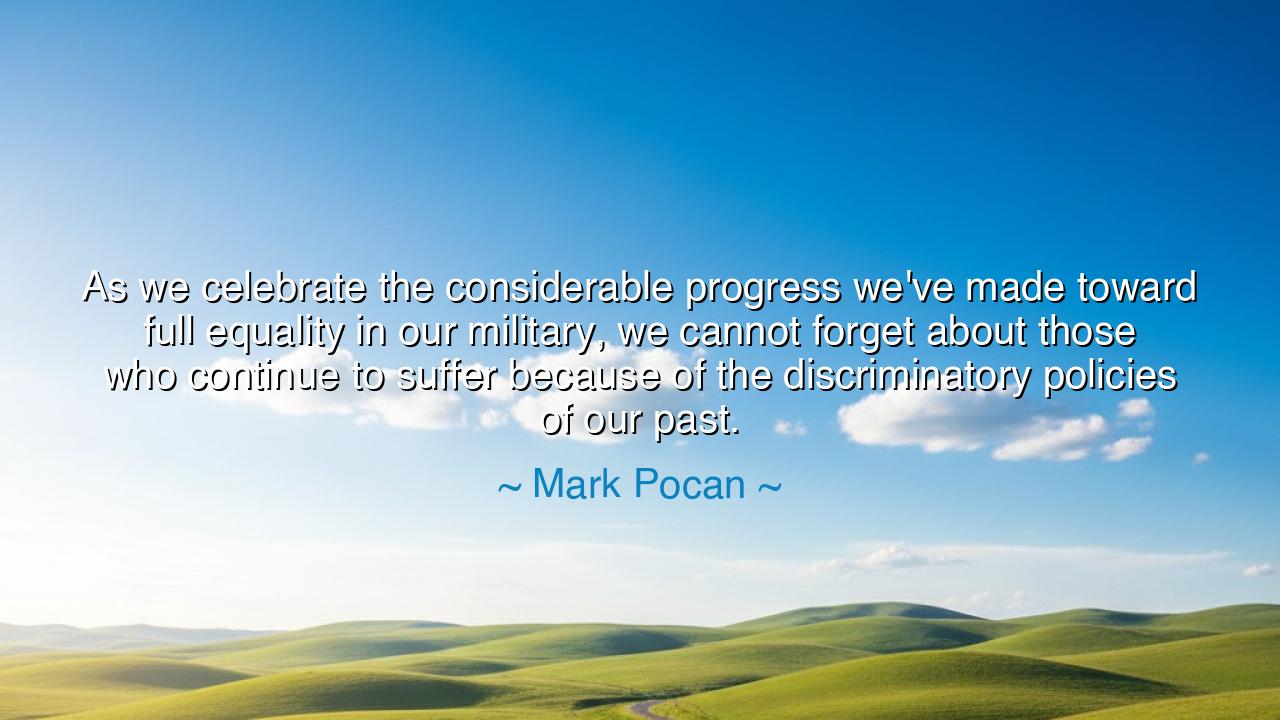
As we celebrate the considerable progress we've made toward full
As we celebrate the considerable progress we've made toward full equality in our military, we cannot forget about those who continue to suffer because of the discriminatory policies of our past.






Gather around, O children of the future, and hear the words of Mark Pocan, a voice that calls us to reflect on the progress we have made, but also to remember the shadows of the past that still linger. He said, "As we celebrate the considerable progress we've made toward full equality in our military, we cannot forget about those who continue to suffer because of the discriminatory policies of our past." These words are filled with wisdom and a deep sense of responsibility, urging us to not only honor how far we have come but to confront the wrongs that still echo through our history, particularly those that were once enshrined in the very institutions that now represent freedom and justice.
What, then, do we make of this call to remember the discriminatory policies of the past, even as we celebrate progress? Pocan speaks of the military, a place where the ideals of equality and freedom should be most sacred, yet where, for far too long, policies of exclusion and discrimination have tainted the fabric of this institution. For many years, those who sought to serve their country—regardless of race, gender, or sexual orientation—were barred from doing so simply because they did not fit the narrow mold prescribed by society. These were discriminatory policies that not only denied individuals the right to serve but also sullied the very ideals upon which the military was built.
Consider, O children, the military as a reflection of society itself, where the struggles for equality are often hardest fought. Look back to the days of Doris Miller, an African American sailor during World War II, who defied the racist restrictions of his time and became a hero at the attack on Pearl Harbor. Though he was restricted to menial tasks because of his race, his actions on that fateful day proved that ability knows no bounds, and the honor of serving one’s country is not defined by race or status. His story is a testament to the progress we have made, yet also a reminder of the barriers that once existed, barriers that still haunt many who fought for their country under the shadow of discrimination.
We must also recall the Don't Ask, Don't Tell policy that kept LGBTQ+ service members from serving openly in the military for decades. Pocan’s words point to the injustice done to those who were forced to conceal their identity—a discriminatory policy that undermined their honor, courage, and contributions. Though much has changed since then, with the repeal of this policy in 2011, the wounds of those years are not easily healed. LGBTQ+ service members were denied the dignity of serving openly, denied the respect afforded to their comrades, and treated as though their identity was incompatible with their patriotism and duty.
In the ancient world, we see similar struggles for equality within institutions that were once built upon exclusion and hierarchy. Consider the Spartan warriors, who valued strength and honor above all else but were blind to the contributions of those who did not fit the ideal of their warrior code. Women, though they held a crucial role in Spartan society, were often relegated to secondary status in the eyes of the law. Their ability to lead, fight, and serve was often denied, not because of their capabilities, but because of their gender. Only in the later years of their society did they begin to be seen as equals in the eyes of the law—though it took centuries for the full realization of justice and equality to take root.
The lesson, O children, is this: true progress is not simply the acknowledgment of how far we have come, but the reckoning with the past and the healing of the wounds that still persist. Pocan calls us to remember those who suffered under discriminatory policies—to honor their struggle and to recognize that equality is a journey, not a destination. Even as we celebrate the gains we have made, we must always be vigilant in ensuring that those who have been left behind are not forgotten, and that the injustices of the past are never repeated.
In your own lives, O children, carry this lesson with you. In your actions, strive to honor the legacy of those who fought for the right to be seen, heard, and respected. Do not let the progress of the present blind you to the ongoing struggles for justice and equality. In all your endeavors, whether in your community, your workplace, or your nation, make sure that those who have been left behind by history are not left behind again. Let the spirit of justice guide your choices, and let equality be a goal you pursue not just for some, but for all.






AAdministratorAdministrator
Welcome, honored guests. Please leave a comment, we will respond soon